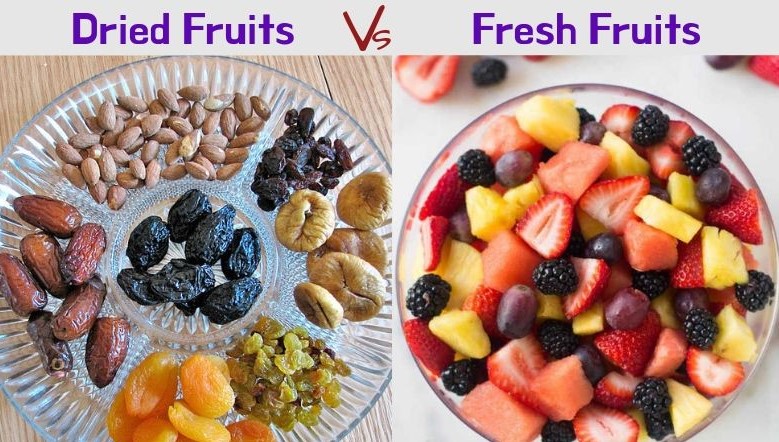When it involves consuming fruit, any kind is healthier than processed foods. Each dried and fresh fruit contains vitamins and minerals that aren’t found in shelved foods. The edible fruit is path combined as chocolate chips square measure to cookies. One doesn’t style nearly as good while not the opposite, however, is edible fruit healthy? Compared with vitamins C and E, dried fruits have superior quality antioxidants with figs and dried plums being the simplest. The dried selection is additionally higher in calories and sugar than an equivalent quantity of fresh fruit. However thereupon being the same, there’s still an argument production over which sort of fruit is better & dried or fresh. Dried fruit is chock packed with vitamins, minerals, fiber, and phytochemicals. Plus, it’s non-perishable, palatable, and nice for consumption on the run.
Fresh Fruit Advantages
Fresh fruit has many advantages over processed fruit. Fresh fruit contains more nutrients and enzymes than processed fruit, which helps keep your body healthy. Fresh fruit is also more flavorful than processed fruit. Fresh fruit is a great way to help you lose weight. Fresh fruit is lower in calories than processed fruit, and it is packed with vitamins, minerals, and nutrients. For example, fresh bananas are loaded with potassium and magnesium. They are also a good source of potassium, which helps balance your blood pressure.
Also, fresh fruit has been shown to be more effective than artificial sweeteners in raising the body’s insulin sensitivity. The fruit is also an excellent source of fiber. Fiber can help keep blood sugar levels in check and keeps your digestive system running smoothly. Fiber is important for most people, but it can be difficult to find if you don’t eat a whole-grain diet. Fiber is also important for people who suffer from chronic diseases such as diabetes, high blood pressure, and heart disease.
Fresh fruit has many advantages, including:
Nutritional Value: Fresh fruits are an excellent source of vitamins, minerals, and other important nutrients. They provide antioxidants that help protect against disease, and their fiber content helps to maintain healthy digestion.
Hydration: Fresh fruits are high in water content, which helps to keep the body hydrated. Staying hydrated is important for many bodily functions, such as regulating body temperature and promoting healthy skin.
Low in Calories: Most fresh fruits are low in calories and can be an excellent addition to a healthy diet. They are a good option for snacking and can help to reduce overall calorie intake.
Versatility: Fresh fruits can be eaten in a variety of ways, including raw, cooked, or blended into smoothies. They can be used in a variety of dishes, such as salads, desserts, and main courses.
Boost Immune System: Fresh fruits are packed with vitamins and minerals that are essential for a strong immune system. Vitamin C, for example, is found in many fruits and can help to fight off infections and illnesses.
Promote Weight Loss: Eating fresh fruits can help to promote weight loss due to their low-calorie content, high fiber content, and ability to keep you feeling full. In addition, the natural sugars found in fresh fruit can satisfy sweet cravings without the need for processed sugar.
Improve Heart Health: Fresh fruits are a great source of potassium, which can help to lower blood pressure and reduce the risk of heart disease. Many fruits are also low in saturated fat, cholesterol, and sodium, which can further benefit heart health.
Mental Health Benefits: Studies have shown that a diet rich in fresh fruits can have positive effects on mental health, such as reducing the risk of depression and anxiety.
Dried Fruit Advantages
Dried fruit can be a nutritious and convenient addition to your diet. Here are some advantages of dried fruit:
Longer Shelf Life: Dried fruit has a much longer shelf life than fresh fruit. This makes it a convenient option for those who don’t have access to fresh fruit year-round or who want to stock up on healthy snacks.
Portable and Convenient: Dried fruit is lightweight and compact, making it a great option for snacking on the go or packing in a lunchbox. It doesn’t require refrigeration, which makes it even more convenient for travel or outdoor activities.
Nutrient-Dense: Dried fruit is packed with nutrients such as fiber, vitamins, and minerals. While the drying process may reduce the water content of the fruit, it concentrates the nutrients, making it a dense and nutritious snack.
Energy Boost: Dried fruit is a good source of natural sugar, which can provide a quick boost of energy. It’s a great option for pre- or post-workout snacking.
Versatile: Dried fruit can be used in a variety of recipes, from baked goods to trail mix. It can add natural sweetness and nutrition to many dishes, making it a versatile ingredient.
Can Be Eaten Year-Round: Unlike fresh fruit, dried fruit is available year-round. This means you can enjoy your favorite fruits even when they’re out of season.
Less Waste: Drying fruit helps to prevent food waste by extending the life of the fruit. It’s also a good option for using up excess fruit from your garden or farmers’ market.
Below is a unit a number of of the advantages garnered from the uptake of edible fruit:
- Ups your nutrient intake.
- Boosts colon health.
- Improves diet.
- Encourages weight loss.
- Reduces the danger of diseases.
- Lowers blood pressure levels.
- Keeps you satisfiable.
- Relieves constipation.
- Improves bone health.
Sugar and Calorie Content
When it involves sugar and calorie count, each dried and recent fruit have concerning a similar quantity. The distinction here can matter additional for individuals making an attempt to slim, and anyone diagnosed with the polygenic disease. Dieters want water and fiber from the fresh fruit to remain fuller longer and to stay hydrous. Dried fruits won’t last as long on your abdomen, and you’ll need to eat much more to be content, which may ultimately cause you to intake additional calories.
People diagnosed with polygenic disease have to be compelled to take care of dried fruits, as they contain targeted amounts of sugar. This might simply cause spikes in blood sugar levels. The additional fiber in fresh fruits helps decrease the speed at which the sugar reaches the blood.
Vitamins and Minerals
Fresh fruit has slightly additional vitamins and minerals than dried fruit. The drying method for fruit decreases its nutritional worth, but not by abundance. Another necessary factor to stay in mind once the comparison the two is that the water in fresh fruit concentrates the nutrients. this provides it a small edge over its dried counterparts. Water-soluble vitamins particularly are reduced within the dehydration method for dried fruits.
Don’t rule out the edible fruit throughout this area, though. many of them pack a robust punch even though they’re dehydrated. Remember, the distinction is slight, thus there are still several nutritional values among the dried versions. Here area unit one or two of stats on the nutrient content in an exceeding range of the ton of common dried fruits:
Dried Apricots: A 0.5 cup provides over four grams of fiber and 156 calories. It’s conjointly full of fat-soluble vitamins, potassium, and copper. you’ll be able to move 40 % of your daily fat-soluble vitamin intake from one serving.
Dried Pears: A 0.5 cup provides over seven grams of fiber and 236 calories. They conjointly contain vitamin A, vitamin C, iron, and copper.
Dried Grapes (raisins): A 0.5 cup provides a pair of 0.5 grams of fiber and 217 calories. Raisins also are a decent supply of iron, zinc, and B vitamins.
Dried Figs: A half-cup provides a bit over seven grams of fiber and 185 calories. They’re high in K, Mg and Ca.
So, Which Is Healthier?
It’s clear that there’s positively a bonus to the uptake fresh fruits:
- Fresh fruit keeps you feeling fuller longer; an excellent profit for anyone making an attempt to slim down.
- Fresh fruit contains a lot of fiber that is sweet for your gastrointestinal system.
- Fresh fruit has additional vitamins and minerals than dried fruits.
But this doesn’tessentiallymean you shouldn’t eat dried fruitsas a result ofthey need their own benefits as well:
- Dried fruits additionally contain fiber permanently organic process
- Dried fruits contain vitamins and minerals, and once paired with alternative biological process foods, will boost overall healthy diet.
- Dried fruits are low in fats and wealthy in sensible carbohydrates, which can even be useful for dieters.
Ultimately, whether or not it’s dried or fresh if you’re eating fruit, then good for you. Yes, there’s a profit to ingestion contemporary fruit, however, dried fruits also are nutritive. As long as you are not completely ingestion one kind, you’ll get pleasure from the advantages of each. Sprinkle some raisins onto your cereal, and so have a contemporary, juicy apple with lunch.
It extremely boils all the way down to what’s best for you (personal preference) and keeping a well-balanced diet. There are also times once it’s a lot of convenient to own dried fruits, and that’s OK too. As long as you’re happy and healthy, you’ll fancy each.
When is the Best Time to Eat Dried Fruit?
Have you ever questioned, Is dried fruit healthy to eat throughout the summer? it’s, however overwhelming dried fruits throughout the cold winter months is also a lot of sensible. Contemporary fruit is a smaller amount on the market throughout now, creating edible fruit a healthy variety. Most edible fruit has comparable nutrients to fresh fruit (except it’s lower in vitamins C and a few of the Bs).




